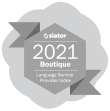Yes, all of our linguists are. We work only with native speakers of the target language who have a proven track record of experience in certain subject areas and who have passed all of AD VERBUM's testing procedures. We have been working with our core language-specific linguist teams for many years.
Yes, most of the content AD VERBUM translates is specific to the subject area. We rarely translate general and simple texts. We have teams of expert linguists and subject matter experts for the areas we specialize in for all the target languages we handle.
Yes, AD VERBUM can have several linguist teams work on one project simultaneously to meet challenging deadlines, additionally, we use industry-specific translation software to speed up all of our internal translation workflows.
Technical Questions
DTP, or Desktop Publishing, is the process of creating documents using specialized software, with PDF among the most common types of output files.
DTP is needed to ensure that the translated content has the same formatting, layout and image quality as the source documents created using specialized DTP software. DTP is a separate service done by freelance DTP resources, not by translators. If the source content was designed using DTP software, the same should be used to design the translation.
Having the original source files allows the team to create a document with the same layout, formatting and image quality as in the source. Using DTP software to recreate the content from scratch is more expensive than using the original source files; it is more time-consuming and the final result may not be a 100% accurate representation of the source.
Find out how to lower PDF translation costs in our blog article
LSO, or Linguistic Sign-Off, is a final quality assessment carried out by the linguist who reviews the translated content in its final form, such as PDF. This step is usually carried out after DTP and is needed to make sure that final quality meets the required standard.
Translation Memories are databases of content in the source and target languages. Translation Memories are updated with each translation project for a specific client. Any content previously translated for the client will get a match with the Translation Memory, giving us the following advantages: (1) consistency with previously translated content (2) shorter turnaround times and (3) lower translation costs.
Find out more about our Translation Technologies
Localization Engineering is the preparation of the client's content for translation in a CAT tool, updating of glossaries and Translation Memories and assisting the project management and linguist teams with the technical aspects of translation.
We secure personal and sensitive client data in full compliance with ISO 27001:2013 and the GDPR (General Data Protection Regulation). We own our company building, which helps ensure the security and confidentiality of client and project-specific data through 24/7 video surveillance of the premises and other ISMS features. Client data are stored in our high-end in-house server room.
Find out more about how we keep your data secure
AD VERBUM holds three ISO certificates: ISO 9001, ISO 17100 and ISO 27001.
Find out more information about ISO
In order to check our translations for potential technical errors, the AD VERBUM Language Quality Assurance Department uses automated quality assurance tools. These are specialized programs that check translations for potential issues that may escape the human eye.
Find out more about our Translation Technologies
We consult you on the types and steps of translation workflows, translation-specific software and technology to work out the best approach for your translation needs, in-house or custom platforms, handling of previously translated content and other specific situations.
- DOC
- DOCX
- RTF
- XLS
- XLSX
- PPT
- PPTX
- TXT
- ODT
- XML
- IDML
- MIF
- AI
- PUB
- HTML
- SVG
- XLF
- XLIFF
- SRT
- PO
- YML
About Linguistic Processes
You need to send the relevant documents to AD VERBUM Vendor Management and go through our linguistic testing process. We will evaluate you based on specific academic background, experience and linguistic proficiency, and guide you through the onboarding process.
AD VERBUM manages all its translation projects through our Translation Management System (TMS). After onboarding you as our vendor, we will provide you with your individual login credentials and other relevant information to start our cooperation.
Yes, CAT tool proficiency is a mandatory requirement for AD VERBUM vendors, and we also have a specific CAT grid agreed upon during the onboarding process.
We will provide you with a licence for our CAT tool of choice and all the relevant information needed to work on our projects using the tool.
Please contact the AD VERBUM Project Manager or Vendor Manager immediately. We will investigate the situation and advise you on how to proceed.
Open Microsoft Word, go to File > Options > General. Under Personalize your copy of Microsoft Office, type the username you need to use and click OK.
Please whitelist our domain name in your email settings, so that the emails you receive are not labelled as spam. Whitelisting procedures may vary depending on the email provider, so if you need any help, please let us know.
You should consult the internal documentation and agreements provided by AD VERBUM for all payment terms and invoicing, and contact the Vendor Manager directly if you have any further questions.
Yes, we do offer internship opportunities. For more information please contact AD VERBUM Vendor Management.










